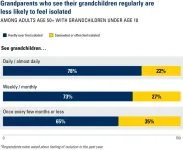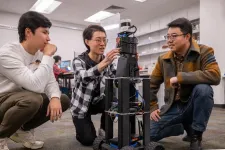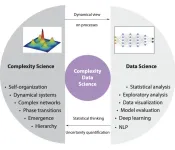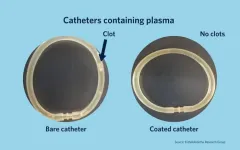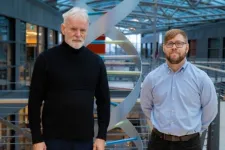(Press-News.org) Decoding Deception: The Psychology of Combating Misinformation, a short film produced by Proceedings of the National Academy of Sciences with support from the Pulitzer Center, addresses one of the most pressing issues of our time: the quest to stem the swelling tide of misinformation.
Decoding Deception explores potential remedies to this growing societal problem. While social media acts as an accelerant for the rampant spread of misinformation on climate change, public health, and politics, the rise of generative AI risks worsening the problem. Left unchecked, disinformation and misinformation can inflict lasting damage on people, institutions, and society writ large.
Growing interest from a group of interdisciplinary researchers has led to numerous efforts to dissect the problem and seek solutions. Decoding Deception follows researchers at the forefront of such efforts as they attempt to unravel the nature of the infodemic and uncover ways to contain it. Their work has yielded some promising early results, but no easy fixes. In the end, an approach borrowed from the field of public health—one that aims to mitigate threats and quash outbreaks before they spread—might offer the greatest chance of success.
Film trailer:
https://youtu.be/E6SqsREJhgw
The complete film can be freely accessed here:
https://www.pnas.org/post/multimedia/combating-misinformation
MEDIA CONTACT: Gene Russo, PNAS, Washington, DC; tel: 202-334-2699; email: erusso@nas.edu
For rights and permissions, please contact Gene Russo, the film’s co-director and PNAS Front Matter Editor.
About PNAS
PNAS is one of the world's most-cited multidisciplinary scientific journals. It covers the biological, physical, and social sciences and mathematics and publishes cutting-edge Research Reports, Commentaries, Perspectives, Colloquium Papers, and actions of the Academy. PNAS publishes daily online and in weekly issues.
For more information about PNAS or the NAS, visit www.pnas.org or www.nasonline.org
END
Decoding Deception: The Psychology of Combating Misinformation
Decoding Deception: The Psychology of Combating Misinformation, a short film produced by Proceedings of the National Academy of Sciences with support from the Pulitzer Center.
2024-11-12
ELSE PRESS RELEASES FROM THIS DATE:
Plant green-up and herbivory in Greenland
2024-11-12
A study links herbivory to phenology in the Arctic. Phenology is the study of the timing of events in the natural world. In recent decades, researchers have investigated how climate change is shifting many natural events. Eric Post and colleagues wanted to understand how a different variable—the presence or absence of herbivores—affects the timing of spring plant growth, or green-up, in Greenland. In an experiment lasting nine years, the authors excluded musk oxen and caribou from some areas, then compared the timing of the spring green-up of 9 tundra plant species in the areas with and without herbivores. Of the plants that showed altered green-up between the conditions, about ...
Grandparents help grandkids in many ways – but the reverse may be true too, poll suggests
2024-11-12
As many Americans prepare to gather with their families for the holidays, a new poll shows the importance of grandchildren in grandparents’ lives.
The poll also suggests that having grandchildren and seeing them regularly may have a link to older adults’ mental health and risk of loneliness.
Although the poll can’t show cause and effect, the findings suggest a need to study the role of grandparenting in older adults’ lives, as part of a broader effort to address social isolation.
At ...
Giving robots superhuman vision using radio signals
2024-11-12
In the race to develop robust perception systems for robots, one persistent challenge has been operating in bad weather and harsh conditions. For example, traditional, light-based vision sensors such as cameras or LiDAR (Light Detection And Ranging) fail in heavy smoke and fog.
However, nature has shown that vision doesn't have to be constrained by light’s limitations — many organisms have evolved ways to perceive their environment without relying on light. Bats navigate using the echoes of sound waves, while sharks hunt by sensing electrical fields from their prey's movements.
Radio waves, whose wavelengths are orders of magnitude ...
Digital twins and complexity data science
2024-11-12
A Perspective suggests that “digital twins” are not simply tools for science but are an example of the integration of complexity science and data science into a new scientific field. A “digital twin” is a digital representation of a real-world object or system. The idea emerged from manufacturing but has been adopted by science, especially by the fields of medicine, immunology, and epidemiology. Digital twins are typically frequently or continuously updated and improved with real data from the real object the digital twin mirrors, allowing ...
‘Moonlighting’ enzymes can lead to new cancer therapies
2024-11-12
Researchers at the Centre for Genomic Regulation (CRG) reveal that metabolic enzymes known for their roles in energy production and nucleotide synthesis are taking on unexpected "second jobs" within the nucleus, orchestrating critical functions like cell division and DNA repair.
The discovery, reported across two separate research papers out today in Nature Communications, not only challenges longstanding biological paradigms in cellular biology but also opens new avenues for cancer therapies, particularly against aggressive tumours like triple-negative breast cancer (TNBC).
For decades, biology textbooks have neatly compartmentalised ...
One genomic test can diagnose nearly any infection
2024-11-12
Next-generation metagenomic sequencing test developed at UCSF proves its effectiveness in quickly diagnosing almost any kind of pathogen.
A genomic test developed at UC San Francisco to rapidly detect almost any kind of pathogen – virus, bacteria, fungus or parasite – has proved successful after a decade of use.
The test has the potential to vastly improve care for neurological infections that cause diseases like meningitis and encephalitis, as well as speed up the detection of new viral pandemic threats. It uses a powerful genomic sequencing ...
Blood vessel-like coating could make medical devices safer for patients
2024-11-12
University of B.C. researchers have developed a groundbreaking coating that could make medical devices safer for millions of patients, reducing the risks associated with blood clots and dangerous bleeding.
The new material, designed to mimic the natural behavior of blood vessels, could allow for safer use of blood-contacting devices like catheters, stents, blood-oxygenation machines and dialysis machines—especially in cases where blood clots are a significant concern.
“This discovery could be a transformative step in the development of safer medical devices,” said Dr. Jayachandran Kizhakkedathu, ...
Sleep is no light matter for bees
2024-11-12
In an emerging red flag for the digital era, sleep experts have warned us to avoid screen time in bed, sounding the alarm that light emitted from phones and other electronic devices can disrupt our sleep patterns. That’s one way that science is waking up to the broad range of health and disease implications related to circadian biology and our daily sleep-wake cycles.
Now, researchers at the University of California San Diego have found that light disruption is not only a health concern for humans. A new study led by PhD candidate Ashley Kim and Professor James Nieh in the School of Biological Sciences has found that artificial light disrupts the circadian rhythms of ...
New study explores the role of BMI in disease risk
2024-11-12
New study from deCODE genetics/Amgen highlights the importance of BMI in pathogenesis of disease, suggesting that reducing BMI alone could lower the risk of several diseases.
Scientists at deCODE genetics, subsidiary of Amgen, published a study today in Nature Communications that sheds light on how Body Mass Index (BMI) influences the risk of various diseases that are comorbid with obesity. The study, which used genetic data from Iceland and the UK Biobank, looked at whether disease risk associated with BMI-related sequence variants are explained completely or partially by their effect on BMI.
The results showed that for some conditions, such as fatty liver disease, glucose intolerance, ...
Guardian, kids, or companions? What do dogs mean to us today
2024-11-12
What role do dogs play in today’s world? For many, they are more than just pets. New findings from the Department of Ethology at Eötvös Loránd University show that whether seen as friends, family members, children or guardians, these roles affect the way dogs are cared for, suggesting shifting dynamics in human-animal bonds shaped by societal trends and individual owner profiles.
In Western cultures, more and more people see their dogs as their best friends, family members or even their furry children. In fact, ...
LAST 30 PRESS RELEASES:
Brainwaves of mothers and children synchronize when playing together – even in an acquired language
A holiday to better recovery
Cal Poly’s fifth Climate Solutions Now conference to take place Feb. 23-27
Mask-wearing during COVID-19 linked to reduced air pollution–triggered heart attack risk in Japan
Achieving cross-coupling reactions of fatty amide reduction radicals via iridium-photorelay catalysis and other strategies
Shorter may be sweeter: Study finds 15-second health ads can curb junk food cravings
Family relationships identified in Stone Age graves on Gotland
Effectiveness of exercise to ease osteoarthritis symptoms likely minimal and transient
Cost of copper must rise double to meet basic copper needs
A gel for wounds that won’t heal
Iron, carbon, and the art of toxic cleanup
Organic soil amendments work together to help sandy soils hold water longer, study finds
Hidden carbon in mangrove soils may play a larger role in climate regulation than previously thought
Weight-loss wonder pills prompt scrutiny of key ingredient
Nonprofit leader Diane Dodge to receive 2026 Penn Nursing Renfield Foundation Award for Global Women’s Health
Maternal smoking during pregnancy may be linked to higher blood pressure in children, NIH study finds
New Lund model aims to shorten the path to life-saving cell and gene therapies
Researchers create ultra-stretchable, liquid-repellent materials via laser ablation
Combining AI with OCT shows potential for detecting lipid-rich plaques in coronary arteries
SeaCast revolutionizes Mediterranean Sea forecasting with AI-powered speed and accuracy
JMIR Publications’ JMIR Bioinformatics and Biotechnology invites submissions on Bridging Data, AI, and Innovation to Transform Health
Honey bees navigate more precisely than previously thought
Air pollution may directly contribute to Alzheimer’s disease
Study finds early imaging after pediatric UTIs may do more harm than good
UC San Diego Health joins national research for maternal-fetal care
New biomarker predicts chemotherapy response in triple-negative breast cancer
Treatment algorithms featured in Brain Trauma Foundation’s update of guidelines for care of patients with penetrating traumatic brain injury
Over 40% of musicians experience tinnitus; hearing loss and hyperacusis also significantly elevated
Artificial intelligence predicts colorectal cancer risk in ulcerative colitis patients
Mayo Clinic installs first magnetic nanoparticle hyperthermia system for cancer research in the US
[Press-News.org] Decoding Deception: The Psychology of Combating MisinformationDecoding Deception: The Psychology of Combating Misinformation, a short film produced by Proceedings of the National Academy of Sciences with support from the Pulitzer Center.

